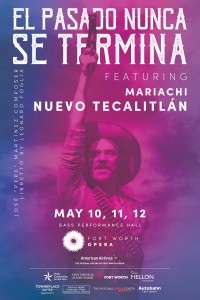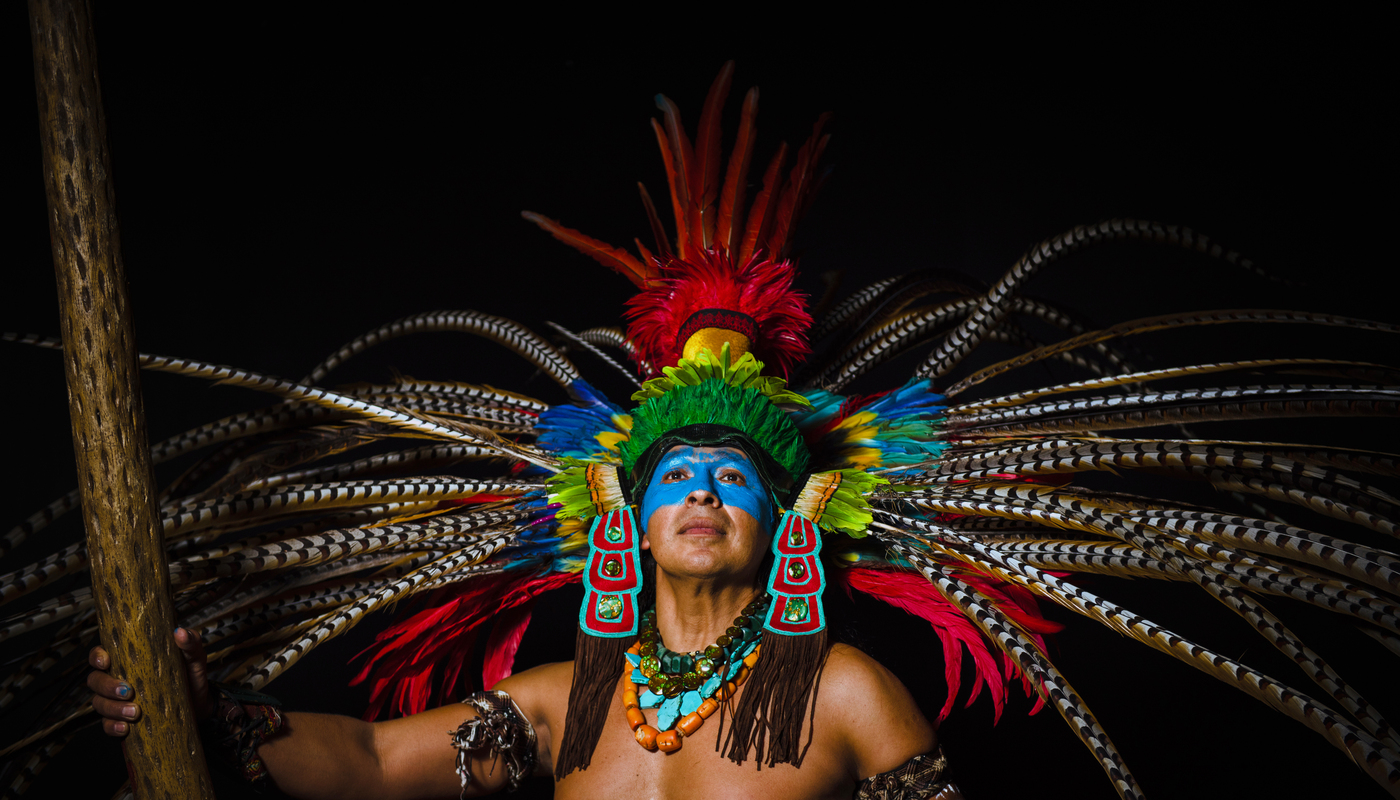Can Singing In Spanish With Mariachis Draw A Latino Audience? Fort Worth Opera Thinks So.
ArtandSeek.net May 8, 2019 18By and large, operas are performed in Italian, German or French. And they’re usually accompanied by classical orchestras. But a new show at Fort Worth Opera goes against the grain.
It’s in Spanish and features mariachi accompaniment. Art&Seek visited a recent rehearsal at the Opera’s studio at La Gran Plaza de Fort Worth to learn more about the show and to better understand its intended audience.
“How do we draw a younger and more diverse audience?”
That’s the question almost every opera company in the country has been asking themselves for years. The answer? Well, there isn’t one solution. But the Fort Worth Opera thinks they have a strategy that’ll work for them…

Photo of the world famous Mariachi Vargas de Tecalitlán ensemble performing in ‘Cruzar la Cara de la Luna’ at Fort Worth Opera.
Photo: Karen Almond/Fort Worth Opera
It’s called Noches de Opera. It’s Spanish-language programming. And over the past two years, legendary ensembles like Mexico’s Mariachi Vargas de Tecalitlán and Mariachi Nuevo Tecalitlán have come to Fort Worth to stage one-of-a-kind productions, like the upcoming mariachi opera.
Why ‘Noches de Opera?’

Paulina Magdaleno, audience engagement and special events manager at Fort Worth Opera.
Photo: Fort Worth Opera
Paulina Magdaleno is the audience engagement and special events manager at Fort Worth Opera. That means it’s her job to dream up fun events and happenings in which the company can connect with audiences.
“Yea! It’s my job to spread the word about what we do at Fort Worth Opera,” she says. “We partner with museums and we partner with bars. And at the bars, we do these events called “Opera Shots.” That’s a “pop-up” style concert event that’s very laid back and our singers perform. The last one we had, I was able to get one of the singers to climb up on the bar and to belt out a song.”
Magdaleno says she loves her work. And that she wouldn’t do what she does for Fort Worth Opera if she didn’t think they were being sincere about their mission to draw Hispanic and Latino audiences into Bass Performance Hall for opera performances.
“This year, we’re presenting our second mariachi opera – “El Pasado Nunca se Termina,” she says (“The Past is Never Finished”). “And our Spanish-language programming actually started as an initiative 2017. It was Fort Worth Opera’s effort to reflect the diversity of our community. But now it’s a program. So it will stay here forever! And I’m super-excited about that!”
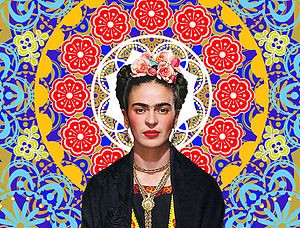
Poster art for “The Last Dream of Frida and Diego (El Ultimo Sueño de Frida y Diego)”
Photo: Fort Worth Opera
“El Pasado” is the third Spanish-language show produced at Fort Worth Opera. Next year, they’re bringing “Zorro” to the stage. But Magdaleno is most excited about what’s happening in 2021. That’s the year Fort Worth opera premieres “The Last Dream of Frida and Diego (El Ultimo Sueño de Frida y Diego),” a Spanish-language opera exploring the passionate relationship of iconic Mexican artists Frida Kahlo and Diego Rivera.
“I know what you mean when you’re like, “Now you’re reaching out to us. Now you’re going Hispanic,”” Magdaleno says excitedly. “And well, yea! Because we have to reflect our community. So I’m trying to introduce them to this opera world, hoping that one day they will come and see “La Bohème.””
Fort Worth Opera’s artistic director Joe Illick stands enthusiastically behind this effort. He says producing Spanish-language programming is necessary. He knows Fort Worth’s has the state’s fastest-growing Hispanic population. And he understands representation is important.
“Of course everybody thinks that Verdi is beautiful and that Puccini is beautiful and Mozart is beautiful,” says Illick. “But all of us identify with our own culture and our own roots in a special way. And so it’s important to tell everybody’s story.”
Telling A Story For Hispanic And Latino Audiences
Illick’s point about representation and its importance to audiences is what makes the upcoming performance of “El Pasado” so special. The music was written by Mexican composer José “Pepe” Martínez, who’s been dubbed “the Mozart of Mariachi”. The cast is made up of only Latinos. And the opera’s story is chock full of Mexico’s traditions and cultural history.
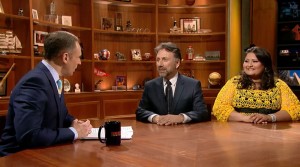
“El Pasado’s” Leonard Foglia & Vanessa Cerda-Alonzo talked about the show’s importance on WTTW’s “Chicago Tonight.” Click the image to watch the interview.
Photo: Screen shot of “Chicago Tonight.”
“El Pasado” centers on a bittersweet love story that begins during the Mexican Revolution and it concludes in present-day. And like most tales of star-crossed lovers, “El Pasado” involves the fate of two families – one the wealthy owners of a large estate, the other the indigenous people who work on the plantation. And in it, significant themes like indigenous erasure, classism, and unspoken links to Mexico’s history are explored in the lyrics written by librettist and director Leonard Foglia.
“I lived in Mexico for nine years. And I’ve always been fascinated by the notion of the mestizo and the mixed blood,” Foglia explains. “You know, what really makes up present-day Mexico.”
Foglia – an Italian-American – leads and directs productions on Broadway quite regularly. And he’s known locally for directing the Dallas Opera’s “Everest” and “Moby-Dick.” But when asked about writing the lyrics to a Spanish-language opera, he says the inspiration didn’t come from within.
“Anthony Freud, who was the then-head of Houston Grand Opera, who’s now head of Lyric Opera of Chicago, he called me one day, and said, ‘What do you think of the notion of a mariachi opera?’ And I said to him, ‘What do you want it to be about? And he said, ‘All I want is something for the Hispanic community. I want something for them.’”
With that in mind, Foglia posed a couple of questions to himself before he started writing:
“When you look in the mirror what do you see? Where does this face come from? What are my roots? Which is sort of a terrible, clichéd word. But that’s what started the whole process.”
A Show The Actors Are Proud To Be A Part Of

“El Pasado Nunca se Termina”
Photo: One Nine Photography, Fort Worth Opera
At a rehearsal for “El Pasado,” Foglia and the show’s actors gather around a piano to discuss the material. And the director begins by discussing the future.
“It’s dawning on me how much we talk about the future in this show,” he says to the actors. “In the previous scene, they’re talking about the future. And here, you’re talking about it too. And the characters feel like their story has been already written in stone. But there’s this pull. And it’s biological pull towards one another. But it’s a pull towards the future. Think about that. And let’s start from the top.”
The piano begins and tenor Daniel Montenegro begins to belt. Montenegro is playing Luis. He’s one of the opera’s star-crossed lovers. And the half-Mexican and half-Cuban performer’s voice fills the room. Montenegro has played this role before. And he says playing it brings him great joy because it’s allowed him to reconnect with his childhood. He grew up in California surrounded by music.
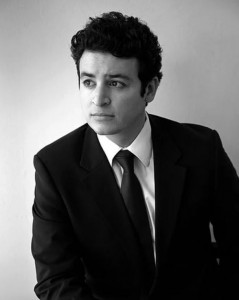
Tenor Daniel Montenegro sang the role of Luis.
Photo: ada-artists.com/tenor-daniel-montenegro
“It was such a long time that I had been away from home,” he says. “And when I got cast in this piece, you know, I was like ‘Wow! I am Mexican. This is my heritage.’ And just to dive into that and to be able to sing with this amazing mariachi, it really was like ‘This is home.’ Ya know.”
The star of “El Pasado,” Abigail Santos Villalobos, has similar feelings. “This is my first time working on a fusion piece like this,” she says. “It has been an amazing experience. You feel represented for the first time. It’s a privilege and an honor to be cast in opera that represents a voice that is not often heard in this environment.”
The Cuban performer says the show reminds us of our past and encourages us to build upon it.
“It connects with every single Latino. You don’t have to be Mexican necessarily to connect with this story, because it’s a beautiful story and you know, the past is never finished! It’s always with you,” says Santos Villalobos.
And that’s a message that all audiences can connect with.

Soprano Abigail Santos Villalobos with Mariachi Aztlan sings “El amor en las sombras” or “Love in the Shadows.”
Photo: “Chicago Tonight”
Interview With Director And Librettist Leonard Foglia
Leonard, this is a sort of Romeo-and-Juliet story. We’ve got star-crossed lovers, adversarial families and drama, right? What else should the audience know? You mentioned before we got started here this theme of ‘going home.’
This is your second mariachi opera. The first was a hit. This one in all the reviews I’ve read has gotten nothing but raves. And, I’m curious, what drew you to this genre of cross-mixing opera and mariachi music?
So, it was his idea to do it. His inspiration behind doing it was a pure one. He told me, once we decided to go forward with it, and we had José “Pepe” Martinez to write the music, he told the board of his opera, ‘I’m not doing this so we build our audience for “La Bohème.” I’m not doing this for us. I’m doing it for them.’ And I said to him, ‘What do you want it to be about? What do you want it?’ And he said, ‘All I want is something for the Hispanic community. I want something for them.’
And I heard Daniel talking about what it is to see similar faces up on the stage, and that’s what I’ve noticed as it’s gone along. Not only are you putting Mexicans and Mexican-Americans up on the stage. Not only are we telling their story. We’re telling it with their genre of music. And I didn’t, honestly, realize the power of that until I got in front of an audience.
You’ve helped to bring some pretty big shows to life onstage, you know – “Moby-Dick,” “Everest” – alone here in the North Texas region. And those are huge. This is also huge. You’re bringing in one of the world’s best mariachi ensembles, bringing together Latin voices who are also at the top of their game. And I’m curious, how does that compare? Or is it slightly different?
And you know, I always try to be driven by the text. And the best way to tell the story from what’s given to me. When I created it, it’s a little bit harder because I have to switch gears from one to the other.
It’s just stories, right? They’re just stories. Do we enjoy a big blockbuster film any more than a small independent film? We enjoy them, just in different ways. As long as they’re fulfilling in the end.
Mawajdeh: Mariachi music is beloved by many. For you, you mentioned that melody, you mentioned that variety. What do you enjoy most about it?
Mawajdeh: Does that not happen in opera?
Mawajdeh: This show has been brought to the Fort Worth Opera as part of an initiative of sorts. For the past couple of years, they’ve been trying to reach Latin, Hispanic communities. It’s really a part of their DNA now. And you’re assisting with that. You mentioned seeing Latin faces in the audience. And I’m curious, do you think this works?
How they receive the piece is of course important. I want them to relate to it. I want them to enjoy it. I want them to feel part of it. But you also want them to feel part of the building. You want them to feel ownership of that place. It’s like, ‘Oh the opera house. That’s where the white people go,’ you know? ‘That’s where the other people go.’
On some level, they come to this simply because it’s a mariachi band, simply because it’s a Mexican story. But then the next time they drive by the building—they’ve been in that building. Something that means something to them has happened. Whether they come to see the opera “La Bohème,” whether they come to see “Porgy & Bess” — I don’t really know any of the statistics on that. Because I guess my mission is still the same one given to me originally, which was ‘This is not for us. It’s for them.’
Interview questions and answers have been edited for brevity and clarity.

